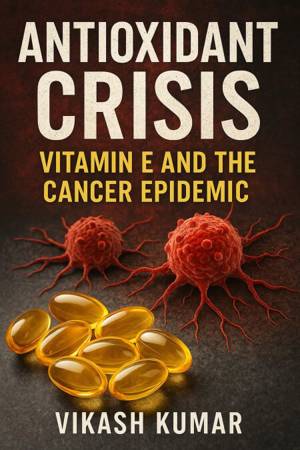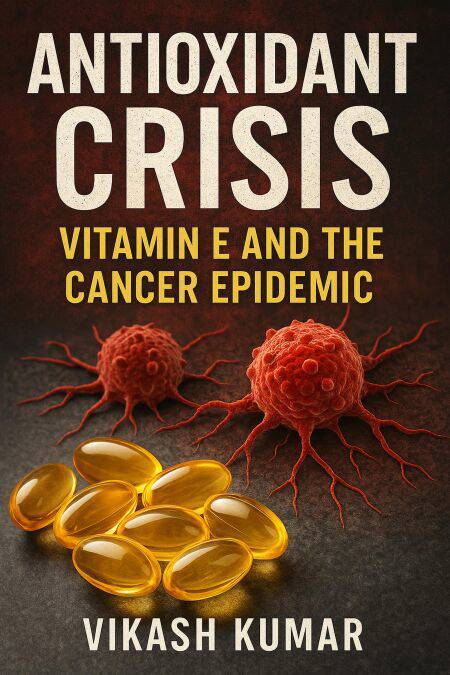
- Retrait gratuit dans votre magasin Club
- 7.000.000 titres dans notre catalogue
- Payer en toute sécurité
- Toujours un magasin près de chez vous
- Retrait gratuit dans votre magasin Club
- 7.000.0000 titres dans notre catalogue
- Payer en toute sécurité
- Toujours un magasin près de chez vous
Description
Antioxidant Crisis: Vitamin E and the Cancer Epidemic by Vikash Kumar is a groundbreaking exploration of the rise, fall, and reimagining of Vitamin E as a cornerstone of antioxidant therapy, with a particular focus on its complex relationship with cancer. This meticulously researched book traces the scientific, historical, and societal dimensions of the antioxidant crisis, offering a nuanced perspective on how initial enthusiasm for Vitamin E as a preventive agent for chronic diseases gave way to critical scrutiny and a call for evidence-based strategies. Through a blend of scientific rigor, clinical insights, and real-world narratives, Kumar unravels the promises and pitfalls of Vitamin E, providing a compelling framework for understanding its role in the modern health landscape.
The book begins with the science of antioxidants, delving into the mechanisms of oxidative stress and Vitamin E's role in cellular protection (Chapter 2). It explains how reactive oxygen species (ROS) contribute to cancer through DNA damage and lipid peroxidation, while highlighting Vitamin E's ability to neutralize these threats, tempered by the risks of disrupting redox balance. Chapter 3 charts the historical trajectory of Vitamin E supplementation, from its discovery in 1922 to its peak in the 1980s, followed by the sobering findings of trials like the Selenium and Vitamin E Cancer Prevention Trial (SELECT), which linked high doses to increased prostate cancer risk.
Chapter 4 explores the intricate connection between Vitamin E and cancer, detailing how early hopes, fueled by studies like the Alpha-Tocopherol, Beta-Carotene Cancer Prevention (ATBC) Study, were overshadowed by evidence of harm from over-supplementation. The antioxidant crisis is further dissected in Chapter 5, which examines misconceptions—such as the belief that more antioxidants equate to better health—and contrasts the benefits of dietary Vitamin E with the risks of supplements. Chapter 6 brings the narrative to life with clinical trial analyses, patient stories illustrating both benefits (e.g., in smokers with precancerous lesions) and harms (e.g., increased cancer risk in healthy individuals), and global trends revealing disparities in Vitamin E use.
Chapter 7 proposes a forward-looking approach, advocating for balanced redox strategies, personalized nutrition based on genetic and lifestyle factors, and innovative cancer prevention methods. Finally, Chapter 8 synthesizes these insights, offering key takeaways, policy recommendations to regulate supplements and promote dietary sources, and a research roadmap emphasizing low-dose trials, biomarker development, and precision medicine.
Vikash Kumar, a distinguished researcher in nutritional science, brings a critical perspective to this work, drawing on decades of evidence to challenge conventional wisdom and advocate for a balanced, evidence-based approach to antioxidant therapy. Antioxidant Crisis is an essential read for scientists, healthcare professionals, policymakers, and anyone seeking to understand the complexities of Vitamin E in the context of cancer. It not only chronicles a scientific saga but also charts a path toward safer, more effective strategies for health and disease prevention in an era of evolving medical paradigms.
Spécifications
Parties prenantes
- Auteur(s) :
- Editeur:
Contenu
- Langue:
- Anglais
Caractéristiques
- EAN:
- 9798231700561
- Date de parution :
- 08-07-25
- Format:
- Ebook
- Protection digitale:
- Adobe DRM
- Format numérique:
- ePub

Les avis
Nous publions uniquement les avis qui respectent les conditions requises. Consultez nos conditions pour les avis.






